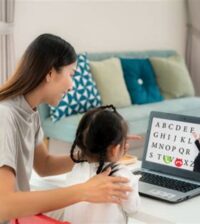This weekend, after five years (minus “school” holidays) of my now 23-year-old daughter living away from home, she is returning from University and I’m preparing for it.
In anticipation of accommodating her growing needs, a couple of nights ago, Chloe’s childhood bed was sold and picked up by its new owners. I know it’s just a piece of furniture but hidden within the particles of wood are thousands of memories over the past two decades. Memories of lying together at the end of the day, Chloe eagerly chatting in an attempt to delay going to sleep. Memories contained within the drawers of the captain bed, which sprung up as we removed all the beanie babies and barbies that had been tucked away – untouched for many years.
Along with the sentimentality of saying goodbye to part of her childhood – as my husband and watched the bed being strapped into the pick-up truck of its new owners – we realized that the timing was right.
Almost five years ago, when Chloe was living on residence at university, somewhat unsure of where her studies would lead her, I wrote a book and titled it Don’t Leave, Please Go. For those of us who have experienced an 18-year-old moving away from home, the emotions are very mixed. After years of recognizing and applauding our children for independent thought and action, while still trying to maintain some control over their lives and ours, the separation is somewhat of a welcome break. But along with a sigh of relief, there’s also often a pit in our stomachs and a lump in our throats as we say goodbye, standing on the precipice of a new chapter in our lives.
The last five years have been a combination of joy and pride as we have watched Chloe evolve into a mature young woman with a clear direction (she is a week away from completing her Masters), along with anguish and anxiety about her not getting enough sleep and staying out too late, for example. And along with watching Chloe blossom into who she is today, my husband and I have changed too.
As empty nesters (our older daughter moved into her condo during the time that Chloe was gone), we have been fortunate to have more time for ourselves and to reconnect as we once were (well, not exactly as we once were!). Personally, I really enjoy not having to share a bathroom (not even with my husband!), listening to music at any level in the morning without fear of disturbing anyone (my husband is an early riser) and eating leftovers for a couple of days in a row (Chloe would rather go hungry than eat the same meal the next day).
So, when Chloe bemoans moving back into the burbs and not looking forward to having to consider us when coming or going, I want to tell her that although I am looking forward to tasting her creative culinary creations, listening to her infectious laugh, being inspired by her interest in adventure and novelty and just hanging out in person, we too are going to be adjusting and accommodating.
I often tell parents with younger children that parenting is a one-way street and suggest that they adjust their expectations accordingly. So, for example, rather than expecting that your 13-year-old will consider your feelings when he wants to spend time with a friend rather than attend a family function, or that your child will do for you because you do so much for her, to try not to take it personally when this doesn’t happen. However, once a neurotypical child has reached the age of 23, or thereabouts, it’s reasonable for our expectations to adjust accordingly and to expect more of a reciprocal relationship.
I believe that while just doing for our kids doesn’t guarantee that they will reciprocate to the same extent, that you will experience the fruits of your labour as your relationship grows into that of adults living together or apart, way different to that of a parent/child relationship when they were younger.
With this in mind, I intend to acknowledge the adjustment that Chloe will likely experience, while believing that she will be able to understand that we too are adjusting to her move back home.
Then, as she wakes up in her adult double bed, more suitable for a grown young woman, and goes about her day, that we shall be able to collaborate and work together, with the knowledge that this period of time, too, is just temporary and that in the not-so-distant future, she will move out and all being well, not need to return “home”. For now, my plan is to make room for her to have space – not just in the bathroom or the kitchen – but when alone, too, and to make the best of this time together, which I know will pass in the blink of an eye.













